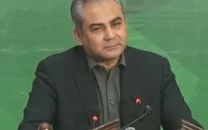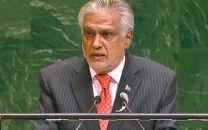FATF move ‘unjust’, Trump aide told
The usual statement suggesting that the two sides discussed issues of mutual interests and bilateral ties was missing

US National Security Council Lisa Curtis. PHOTO: TWITTER/HANDLE
Lisa Curtis, the senior director for South Asia and Central Asia at the National Security Council of the US met Foreign Secretary Tehmina Janjua at the foreign office. The visit remained low key as the foreign office spokesperson simply issued a tweet saying that Curtis met the foreign secretary.
Even the usual statement suggesting that the two sides discussed issues of mutual interests and bilateral ties was missing. This all suggested a new low in ties between the two countries and frustration on part of Pakistan for being placed on the global terror financing watch-list after the US moved a motion with the FATF.
US trying to 'embarrass' Pakistan with terror financing list: minister
Little details were available as to what exactly had transpired during the discussions but some sources suggested the foreign secretary did raise the FATF issue and insisted that US move was ‘unjust’.
The inclusion of Pakistan in the ‘grey-list’ is seen as part of broader US strategy to pressurize Islamabad to do more in the fight against certain militant groups.
Discussions were candid and frank as Curtis – prior to joining the Trump administration – has authored a policy paper along with former ambassador to the US Hussain Haqqani suggesting a new approach towards Pakistan.
The new approach envisaged tough measures including seeking Pakistan’s international isolation if it continued to use militant groups as proxies to advance its strategic objectives.
The recent US move at the FATF appeared to be in line with that policy as Pakistan was even abandoned by its closest allies – China and Saudi Arabia.
A senior official while requesting anonymity confirmed that Pakistan would indeed be placed on ‘grey list’ from June. The challenge now is to avoid getting blacklisted, something that will have far more serious repercussions, the official admitted.
He said the FATF would now share a plan of action that Pakistan had to implement in order to address what it says ‘strategic deficiencies’ to curb terror financing.
Pakistan yet to receive list of actions to stay off FATF terror finance list
The official nevertheless insisted that the move was politically motivated and aimed at undermining Pakistan’s economic progress.
It is believed that FATF wants Pakistan to move decisively against certain groups including Hafiz Saeed’s charities as well as the Haqqani Network.
Pakistan has already amended the Anti-Terrorism Act allowing authorities greater powers to move against groups that are designated as terrorists by the UN Security Council under its resolution 1267.
The move that came just days before the FATF meeting in Paris made little impact on the final outcome of intergovernmental body's meeting that sets global standards against the illicit finance.
Pakistan felt it was hard done by as the FATF placed it on the ‘grey list’ without the final assessment of a ‘mutual evaluation,’ which was “an unprecedented move,” lamented the official.



















COMMENTS
Comments are moderated and generally will be posted if they are on-topic and not abusive.
For more information, please see our Comments FAQ